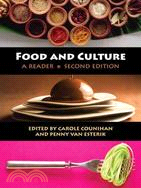| FindBook |
有 1 項符合
Food and Culture A Reader, 2nd Edition的圖書 |
 |
Food and Culture A Reader, 2nd Edition 作者:Penny Van Esterik Carole Counihan 出版社:Routledge 出版日期:2007-12-05 規格: / 608頁 |
| 圖書館借閱 |
| 國家圖書館 | 全國圖書書目資訊網 | 國立公共資訊圖書館 | 電子書服務平台 | MetaCat 跨館整合查詢 |
| 臺北市立圖書館 | 新北市立圖書館 | 基隆市公共圖書館 | 桃園市立圖書館 | 新竹縣公共圖書館 |
| 苗栗縣立圖書館 | 臺中市立圖書館 | 彰化縣公共圖書館 | 南投縣文化局 | 雲林縣公共圖書館 |
| 嘉義縣圖書館 | 臺南市立圖書館 | 高雄市立圖書館 | 屏東縣公共圖書館 | 宜蘭縣公共圖書館 |
| 花蓮縣文化局 | 臺東縣文化處 |
|
|
- 圖書簡介
Food touches everything important to people: it marks social difference and strengthens social bonds. Common to all people, it can signify very different things from table to table.
Food and Culture takes a global look at the social, symbolic, and political-economic role of food. The stellar contributors to this reader examine some of the meanings of food and eating across cultures, with particular attention to how men and women define themselves differently through their foodways. Crossing many subjects, this innovative, first-of-its-kind in the field includes the perspectives of anthropology, history, psychology, philosophy, politics, and sociology. This is the classic text in the field, updated for the first time in a decade, and hailed as the "bible" in the field. A must use for any course on the anthropology or sociology of food. This book comes with a companion website, which you can visit at www.routledge.com/textbooks/9780415977777 - 作者簡介
Carole Counihan is Professor of Anthropology at Millersville University in Pennsylvania and co-editor-in-chief of Food and Foodways. Her earlier books include Around the Tuscan Table: Food, Family, and Gender in Twentieth-Century Florence, Food in the USA, and The Anthropology of Food and Body: Gender, Meaning, and Power.
Penny Van Esterik is Professor of Anthropology at York University in Toronto, Canada where she teaches nutritional anthropology, in addition to doing research on food and globalization in Southeast Asia. She is a founding member of WABA (World Alliance for Breastfeeding Action)and writes on infant and young child feeding, including her earlier book, Beyond the Breast-Bottle Controversy. - 目次
Foreword from The Gastronomical Me, M.F.K. Fisher,
Introduction to the Second Edition, Carole Counihan and Penny Van Esterik
Foundations
1. The Problem of Changing Food Habits, Margaret Mead
Mead’s early government work explores recommendations for changing American food habits and establishes the importance of food studies .
2. Toward a Psychosociology of Contemporary Food Consumption, Roland Barthes
French structuralists explain how food acts as a system of communication and provides a body of images that mark eating situations.
3. The Culinary Triangle, Claude Lévi-Strauss
This classic structuralist statement, often critiqued, shows how food preparation can be analyzed as a triangular semantic field, much like language.
4. Deciphering a Meal, Mary Douglas
Hebrew dietary laws are not irrational but rather precoded messages about purity, defilement, and holiness as wholeness.
5. The Abominable Pig, Marvin Harris
Materialists like Harris reject symbolic and structuralist explanations and explain food prohibitions based on economic and ecological utility.
6. Nourishing Arts, Michel De Certeau and Luce Giard
The "practice of everyday life" includes how French women constitute tradition as they carry out daily meal preparation.
7. The Recipe, the Prescription, and the Experiment, Jack Goody
Shopping lists, menus and recipes are among the earliest and most enduring evidence of written instructions for food use, reflecting significant advances in human knowledge.
8. Time, Sugar, and Sweetness, Sidney Mintz
Colonialism made high-statues sugar produced in the Caribbean into a working class staple.
9. Anorexia Nervosa and Its Differential Diagnosis, Hilde Bruch
Renowned eating disorder psychiatrist Bruch defines true anorexia nervosa as involving distorted body image, inaccurate perception of hunger, hyperactivity, and an overwhelming sense of ineffectiveness.
Gender and Consumption
10. Fast, Feast, and Flesh: The Religious Significance of Food to Medieval Women, Caroline Bynum
Medieval women used food for personal religious expression, including giving food away, exuding foods from their bodies, and undertaking fasts to gain religious and cultural power
11. Appetite as Voice, Joan Jacobs Brumberg
The origins of anorexia nervosa can be found in the nineteenth century fasting of Victorian girls, who used control of appetite as an important form of self-expression.
12. Anorexia Nervosa: Psychopathology as the Crystallization of Culture, Susan Bordo
Anorexia nervosa can be viewed as a culturally over-determined psychological disorder resulting from longstanding cultural ideologies related to mind-body dualism, control, and gender power.
13. Feeding Hard Bodies: Food and Masculinities in Men’s Fitness Magazines, Fabio Parasecoli
Men’s fitness magazines define masculinity through discussions of food and body, increasingly involving men in the concerns about constructing corporeal perfection and regulating consumption to build muscle and strength.
14. The Overcooked and the Underdone: Masculinities in Japanese Food Programming, T.J.M. Holden
Cooking shows featuring male chefs preponderate on Japanese television and propagate one-dimensional definitions of masculinity based on power, authority, and ownership of consumer commodities.
15. Japanese Mothers and Obentos: The Lunch Box as Ideological State, Apparatus Anne Allison
Japanese mothers, in preparing elaborate lunch boxes for their preschool children, reproduce state ideologies of power.
16. Conflict and Deference, Marjorie DeVault
In feeding others, women sometimes reproduce their own subordination by deferring to men’s preferences and thus reinforce the "naturalness" of women’s service and undermine progress toward reciprocal nurturance.
17. Feeding Lesbigay Families, Christopher Carrington
Because feeding work is complex, laborious, and highly gendered, it is problematic in lesbigay families because a full accounting of it would destroy illusions of equality and call into question masculinity of gay men who do it and femininity of lesbians who do not.
Food and Identity Politics
18. How to Make a National Cuisine: Cookbooks in Contemporary India, Arjun Appadurai
Cookbooks written for an Anglophone audience tell unusual tales about the development of a national cuisine, the boundaries of edibility and the logic of meals in post-colonial India.
19. ‘Real Belizean Food’: Building Local Identity in the Transnational Caribbean, Rich Wilk
Transformations in Belizean food from colonial times to the present demonstrate transnational political, economic and culinary influences that have affected the ways Belizean people define themselves and their nation.
20. Let’s Cook Thai: Recipes for Colonialism, Lisa Heldke
Cultural food colonialism is reproduced by food adventurers who seek out ethnic foods to satisfy their taste for the exotic other.
21. "More than Just the 'Big Piece of Chicken': The Power of Race, Class, and Food in American Consciousness", Psyche Williams-Forson
Ethnographic, historical, and literary research reveals not only controlling and damaging stereotypes about African Americans and chicken but also the ways Black women have used chicken as a form of resistance and community survival.
22. Mexicanas’ Food Voice and Differential Consciousness in the San Luis Valley of Colorado, Carole Counihan
Food-centered life histories portray the voices and perspectives of traditionally muted Hispanic women of rural southern Colorado whose food stories reveal differential behaviors and consciousness which promote empowerment.
23. Rooting Out the Causes of Disease: Why Diabetes is So Common Among Desert Dwellers, Gary Paul Nabhan
Skyrocketing adult-onset diabetes among desert dwelling Seri Indians of Northern Mexico suggests that changes in diet have caused this major health problem and that traditional desert foods—especially legumes, cacti and acorns—are protective.
24. Slow Food and the Politics of Pork Fat: Italian Food and European Identity, Alison Leitch
The Slow Food Movement has emerged as an important political force to preserve traditional, artisan foods such as lard from Colonnata, which serves as a case study revealing the politics of Slow Food in the context European market economies.
25. Taco Bell, Maseca, and Slow Food: A Postmodern apocalypse for Mexico’s Peasant Cuisine? Jeffrey Pilcher
Italy’s Slowfood Movement offers strategies for the maintenance of traditional, local, and sustainable Mexican food, which is threatened by the economies of scale and market dominance of multinational giants like Taco Bell.
26. The Raw & the Rotten: Punk Cuisine, Dylan Clark
Punk cuisine--based on scavenged, rotten, and/or stolen food—challenges the hierarchy, commodification, toxicity, and environmental destruction of the capitalist food system.
27. Salad Days: Using Visual Methods to Study Children’s Food Culture, Melissa Salazar, Gail Feenstra, and Jeri Ohmart
Photographic documentation of children’s self-serve salads at Northern California elementary schools was designed to assess the nutritional content of children’s meals, but also conveyed rich information about children’s tastes, food aesthetics, and definitions of appropriate meals.
Political Economy of Food: Transformation and Marginalization
28. The Chain Never Stops, Eric Schlosser
The mistreatment of meatpacking workers in the United States is linked to the high rates of trauma in this dangerous industry and reveals general problems of corporate food production.
29. Whose ‘Choice’? ‘Flexible’ Women Workers in the Tomato Food Chain, Deborah Barndt
"Flexible," part-time, low-wage female labor is an increasingly important component of the global food economy that insures profits for agribusinesses, fast food corporations, and supermarkets, but threatens the livelihood and food security of women and families.
30. The Politics of Breastfeeding, Penny Van Esterik
The commodification of baby food has had severe consequences, but advocacy groups actively resist the promotional tactics of transnational food and pharmaceutical companies.
31. The Political Economy of Obesity: The Fat Pay All, Alice Julier
The culture-wide denigration of the "obesity epidemic" is not only due to its health consequences, but also to the political and economic benefits to the food corporations, the diet industry, and the health professions.
32. Of Hamburger and Social Space, Consuming McDonald’s in Beijing, Yungxiang Yan
In Beijing Chinese consumers associate fast food with being American and being modern. They enjoy the standardization of meals, the hospitable service, the democratic environment, and the cleanliness, which create a desirable space to socialize and linger.
33. Plastic Bag Housewives and Postmodern Restaurants: Public and Private in Bangkok’s Foodscape, Gisèle Yasmeen
Bangkok women can pick up small plastic bags of excellent quality traditional dishes that go with rice at local vendors near their home or workplace.
34. The Political Economy of Food Aid in an Era of Agricultural Biotechnology, J. Clapp
The advent of genetically modified organisms (GMOs) has seriously affected food aid, even in the context of famine and extreme hunger.
35. Street Credit: The Cultural Politics of African Street Children's Hunger, Karen Coen Flynn
In Mwanza, Tanzania homeless children acquire food by working at market stands and restaurants, scavenging garbage, stealing, trading sex for food, and begging. The importance of charity suggests rethinking Sen’s entitlement theory explanation of hunger.
36. Want Amid Plenty: From Hunger to Inequality, Janet Poppendieck
Because of great need, many US volunteers feed the hungry, but charity not only fails to solve the underlying causes of hunger—poverty and inequality—but contributes to it by offering token rather than structural solutions and taking the government off the hook.
|











